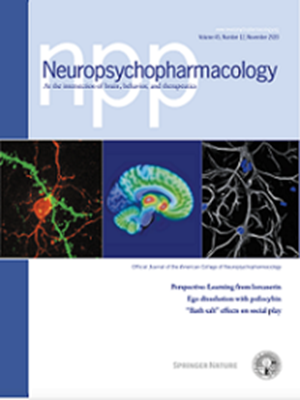Unraveling time-dependent genetic components underlying alcohol response
IF 6.6
1区 医学
Q1 NEUROSCIENCES
引用次数: 0
Abstract
While numerous studies have examined the subjective response to alcohol as an intermediate phenotype to understand its variability, heritability, and predictive capacity for alcohol-related disorders, in-depth analyses linking alcohol reactivity indicators to genetic factors within a large cohort have been absent. Our study aimed to quantify the exact contribution of each genetic variant relevant to the alcohol metabolism to the variability in alcohol response. Specifically, we focused on two primary genes involved in alcohol metabolism (ALDH2 and ADH1B) and three additional loci (ALDH1B1, ALDH1A1, and GCKR) that have been shown to have significant associations with drinking behaviors in Japanese individuals. We conducted the first study to assess the relationship between subjective response to alcohol (SR), evaluated by various assessment subscales, and genetic factors using an intravenous clamp technique in 429 healthy Japanese young adults. By reducing the dimensionality of the data to assess similarity structures, we identified three distinct clusters of SRs and participants. Each participant cluster exhibited a distinct alcohol response profile shaped by specific genetic contributions. Participant cluster 1 demonstrated the strongest response, followed by participant cluster 2, and then participant cluster 3. Participant cluster 1 may also be the most strongly influenced by the allelic status of ALDH2 and ADH1B. SR patterns varied accordingly, and the enrichment of the ALDH2*2 and ADH1B*2, differed across both participant and subscale clusters. Notably, the three participant clusters closely aligned with the three subscale clusters, highlighting a consistent genotype–phenotype relationship. Furthermore, the proportion of variance explained by these genes also varied across subscale clusters. Contrary to known functions, ADH1B showed associations at later timings when ALDH2 associations attenuate. Our three-cluster classification may improve prevention by enabling early identification of individuals at health risk.

揭示酒精反应背后的时间依赖性基因成分。
虽然许多研究已经将酒精的主观反应作为一种中间表型来研究,以了解其变异性、遗传性和酒精相关疾病的预测能力,但在大型队列中缺乏将酒精反应性指标与遗传因素联系起来的深入分析。我们的研究旨在量化与酒精代谢相关的每种遗传变异对酒精反应变异性的确切贡献。具体来说,我们重点研究了与酒精代谢有关的两个主要基因(ALDH2和ADH1B)和三个额外的基因座(ALDH1B1、ALDH1A1和GCKR),这些基因座已被证明与日本人的饮酒行为有显著关联。我们对429名健康的日本年轻人进行了首次研究,以评估酒精主观反应(SR)与遗传因素之间的关系,通过各种评估亚量表进行评估。通过降低数据的维数来评估相似结构,我们确定了三个不同的SRs和参与者集群。每个参与者集群都表现出由特定遗传贡献形成的独特的酒精反应概况。参与者集群1表现出最强烈的反应,其次是参与者集群2,然后是参与者集群3。参与者集群1也可能受到ALDH2和ADH1B等位基因状态的最强烈影响。SR模式也随之变化,ALDH2*2和ADH1B*2的富集程度在参与者和亚尺度集群中都存在差异。值得注意的是,三个参与者集群与三个子尺度集群密切相关,突出了一致的基因型-表型关系。此外,这些基因解释的变异比例在亚尺度集群中也有所不同。与已知功能相反,当ALDH2关联减弱时,ADH1B在较晚的时间显示出关联。我们的三类分类可以通过早期识别有健康风险的个体来改善预防。
本文章由计算机程序翻译,如有差异,请以英文原文为准。
求助全文
约1分钟内获得全文
求助全文
来源期刊

Neuropsychopharmacology
医学-精神病学
CiteScore
15.00
自引率
2.60%
发文量
240
审稿时长
2 months
期刊介绍:
Neuropsychopharmacology is a reputable international scientific journal that serves as the official publication of the American College of Neuropsychopharmacology (ACNP). The journal's primary focus is on research that enhances our knowledge of the brain and behavior, with a particular emphasis on the molecular, cellular, physiological, and psychological aspects of substances that affect the central nervous system (CNS). It also aims to identify new molecular targets for the development of future drugs.
The journal prioritizes original research reports, but it also welcomes mini-reviews and perspectives, which are often solicited by the editorial office. These types of articles provide valuable insights and syntheses of current research trends and future directions in the field of neuroscience and pharmacology.
 求助内容:
求助内容: 应助结果提醒方式:
应助结果提醒方式:


